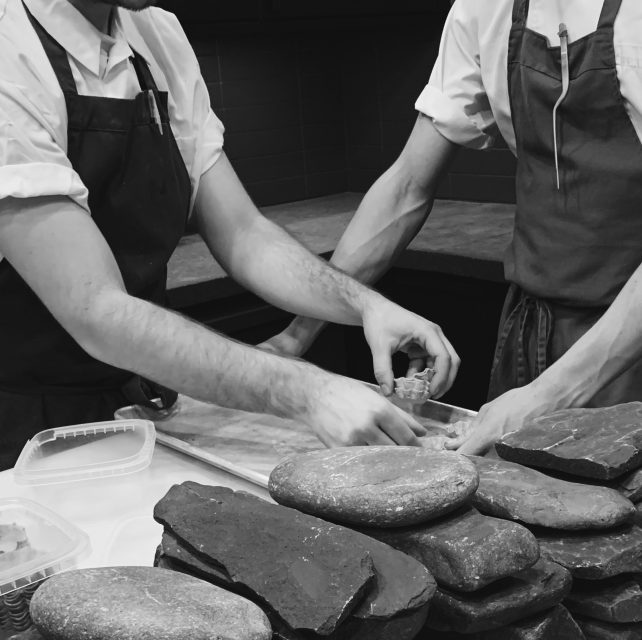A Secular Food Ritual
Maëlys Carre-Pistollet
Food, Self, and Society, World Views, 345-102-MQ
The art of gastronomy is a very methodical process in which I have the luck to participate every week at Le Mousso, founded by the Chef Antonin Mousseau in February 2015. Since then, the restaurant has become a world of hard work, passion, but also friendship. The restaurant is open four days a week (Wednesday, Thursday, Friday and Saturday) and starts serving at 6:00 pm. Nevertheless, the work isn’t over yet- quite the contrary. Monday and Tuesday are for meetings in different area of Quebec; local farms and different businesses in the neighbourhood. Everyone has an important place and position in the restaurant, and everyone is learning from each other everyday. It is simply the foundation of our work as friends, coworkers and family. We spend more time with each other than anybody else in our individual lives. Therefore, we must treat each other with respect and compassion.
The Preparation
The cooks and the chefs arrive late in the morning to prepare all the ingredients that can be made in advance, or that demand lengthy preparation. The Service Staff arrive early in the afternoon to clean the restaurant, wine glasses, tables, chairs and bathrooms. We do the laundry (we use reusable table sheets for the clients) and iron them out. Then, there’s the staff meal, which is probably my favourite hour of the day. Sometimes, the cooks use food that is about to be thrown out or they make nice meals for everyone. We all eat together at a big table with music and talk about our day. It’s a very pleasant moment, as we share glimpses of ourselves and make time to bond. The chef brings pastry or cake from time to time.
The Opening
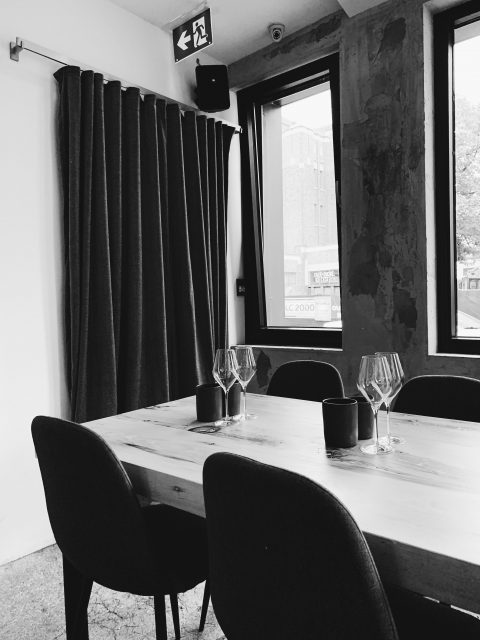 The real opening comes after the staff meal. Everything goes a bit faster and we’re “warming up”. In the kitchen, cooks and the chef prepare the Pass as well as their stations. They organize it meticulously and clean it twice. For the Service Staff, we call a Wine Meeting. Wine Waiters do their presentation about the wines we will serve that night, as well as the new wines they picked up for the clients asking by the glass. We open our little booklet, which one must always have and never be apart from, and we write down the details of each wines (from the flavours to the country, age and production history). The wine waiters are the ones who choose which wine will be married with each plate. After the wine meeting, we set up the entire restaurant. The Maître d’Hotel (the person who oversees the waitpersons and handles reservations) gives us a hand-made plan of the room he draws with each table corresponding to the clients’ reservations. Thus, we know in advance who’s coming and the number of chairs there will be and arrange the restaurant appropriately. Each night, the restaurant looks different because of this. The wine waiters organize the cellar, and the waiters start dressing up. We brush our teeth, arrange our clothes and place our hair. The cooks change their attire as well in complete white apron and button-up shirt. The Maître d’Hotel calls for a second and final meeting. This meeting is the most important one. Everyone gathers in the kitchen. The Maître d’Hotel presents the room for the cooks and the chef. He talks about the reservations, the allergies, the “rush-hour” and divides each sections with the Service Staff. Then, we take out our booklet again as the Chef gives us information about changing plates or courses. If anything changes about the menu, we write it down. By the end of the meeting, since the menu changes a bit everyday, we must learn it by heart as well as the wines and our clients’ names and food restrictions.
The real opening comes after the staff meal. Everything goes a bit faster and we’re “warming up”. In the kitchen, cooks and the chef prepare the Pass as well as their stations. They organize it meticulously and clean it twice. For the Service Staff, we call a Wine Meeting. Wine Waiters do their presentation about the wines we will serve that night, as well as the new wines they picked up for the clients asking by the glass. We open our little booklet, which one must always have and never be apart from, and we write down the details of each wines (from the flavours to the country, age and production history). The wine waiters are the ones who choose which wine will be married with each plate. After the wine meeting, we set up the entire restaurant. The Maître d’Hotel (the person who oversees the waitpersons and handles reservations) gives us a hand-made plan of the room he draws with each table corresponding to the clients’ reservations. Thus, we know in advance who’s coming and the number of chairs there will be and arrange the restaurant appropriately. Each night, the restaurant looks different because of this. The wine waiters organize the cellar, and the waiters start dressing up. We brush our teeth, arrange our clothes and place our hair. The cooks change their attire as well in complete white apron and button-up shirt. The Maître d’Hotel calls for a second and final meeting. This meeting is the most important one. Everyone gathers in the kitchen. The Maître d’Hotel presents the room for the cooks and the chef. He talks about the reservations, the allergies, the “rush-hour” and divides each sections with the Service Staff. Then, we take out our booklet again as the Chef gives us information about changing plates or courses. If anything changes about the menu, we write it down. By the end of the meeting, since the menu changes a bit everyday, we must learn it by heart as well as the wines and our clients’ names and food restrictions.
We end up on a funny note by doing a scream: we scream as high as we can and as long as we can. It’s a very therapeutic thing to do. We give energy and absorb everyone’s energy. By now 6:00 p.m. The Maître d’Hotel unlocks the front door, the cooks hit their stations with their spoons as a “tradition” of good luck and the Service Staff returns behind the bar where we welcome the first guests. We start the music, dim the lights, clean the last windows and mirrors before telling each other “Bon service!” (Have a good service!) in a whisper.
The Service
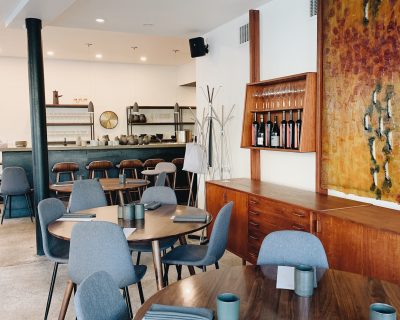 The service is why we are all here. It is the fruit of our preparation. We are giving more than food, but an experience as well. I’ve realized that being in the gastronomy industry is beyond making food out of passion. The quality comes from our love to give love. Everything we do isn’t for us, because at the end we don’t make astronomical profit or eat the food we prepare. Everything we do is for others. Everything we make is for them. Someone working in a restaurant must love humanity above all and understand their guests’ needs without even asking. It’s a power of sensibility, empathy and compassion. We feel when a table needs us, we know their wine preferences just by sharing a few words. All we do is giving, because people smiling at their food is why we’re doing what we do. We know when they’ll ask for their bills just by their legs, by being present but not invading. By understanding they’re here for a special occasion. Only a few people have the power to connect with so many people and give their energy without feeling exhausted. We don’t empty ourselves out, we feed from it. As the night passes, the rush-hour reaches its peak and the chaos becomes a calculated dance. Everyone moves with each other in synchronization, and the only way to learn about each other’s movement is by spending time and learning their habits…
The service is why we are all here. It is the fruit of our preparation. We are giving more than food, but an experience as well. I’ve realized that being in the gastronomy industry is beyond making food out of passion. The quality comes from our love to give love. Everything we do isn’t for us, because at the end we don’t make astronomical profit or eat the food we prepare. Everything we do is for others. Everything we make is for them. Someone working in a restaurant must love humanity above all and understand their guests’ needs without even asking. It’s a power of sensibility, empathy and compassion. We feel when a table needs us, we know their wine preferences just by sharing a few words. All we do is giving, because people smiling at their food is why we’re doing what we do. We know when they’ll ask for their bills just by their legs, by being present but not invading. By understanding they’re here for a special occasion. Only a few people have the power to connect with so many people and give their energy without feeling exhausted. We don’t empty ourselves out, we feed from it. As the night passes, the rush-hour reaches its peak and the chaos becomes a calculated dance. Everyone moves with each other in synchronization, and the only way to learn about each other’s movement is by spending time and learning their habits…
The Close
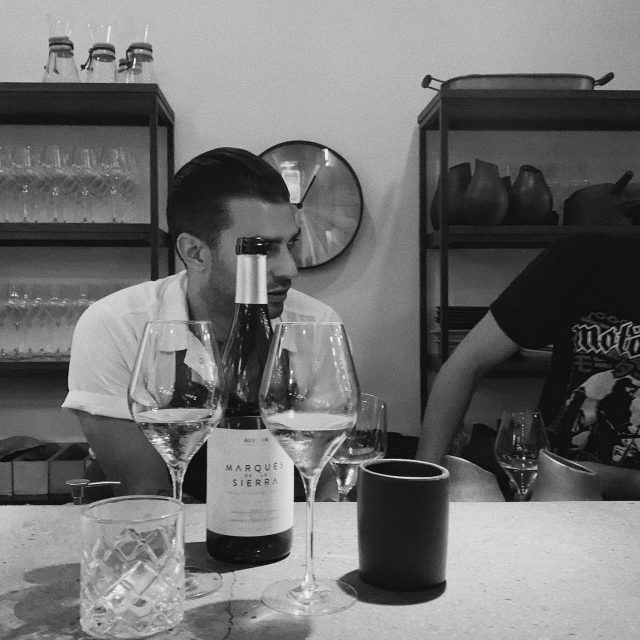 The service comes to an end and the rush-hour passes. The kitchen cools down and everyone starts cleaning their stations. The sound quiets down. Some people go for a smoke, others begin the preparation for the next morning. It takes a long time to empty all the fridges and clean them out. The kitchen have to re-organize their stations and fill them again, writing down the date and rotating the food. The Service Staff doesn’t often travel back to the kitchen, since the cooks and the chef clean the floor by mixing soap and boiling water. They unplug everything, pull their stations and wash every surface. Wine waiters sit down to talk about which wines went fast and the quantity left in the cellar. They change the cart every week by noting down their clients’ wine consumption. As for the waiters, we make sure the last few tables enjoy their moments, relaxing in our own way. We clean the glasses, bars, seats and tables – But we don’t re-set them because they may collect some dust over night. When the last clients leave, the kitchen is almost done cleaning and putting the last pieces of food sous-vide. Now it’s the Service Staff’s turn to clean everything, including the bathrooms. We empty the garbage, brings down the bucket filled with the reusable table cloths so it’s ready to be cleaned out the next day, empty the recycle bins, wash any exposed surfaces and our own fridges as well. We have our own washing machine at the bar for the cocktail and water glasses that needs special care. We carefully dissemble the lot and bring it downstairs at the big washing machines. The Maître d’Hotel pours himself a glass of wine, brings a bottle for the cooks as they finish cleaning and goes upstairs to “write down the numbers.”
The service comes to an end and the rush-hour passes. The kitchen cools down and everyone starts cleaning their stations. The sound quiets down. Some people go for a smoke, others begin the preparation for the next morning. It takes a long time to empty all the fridges and clean them out. The kitchen have to re-organize their stations and fill them again, writing down the date and rotating the food. The Service Staff doesn’t often travel back to the kitchen, since the cooks and the chef clean the floor by mixing soap and boiling water. They unplug everything, pull their stations and wash every surface. Wine waiters sit down to talk about which wines went fast and the quantity left in the cellar. They change the cart every week by noting down their clients’ wine consumption. As for the waiters, we make sure the last few tables enjoy their moments, relaxing in our own way. We clean the glasses, bars, seats and tables – But we don’t re-set them because they may collect some dust over night. When the last clients leave, the kitchen is almost done cleaning and putting the last pieces of food sous-vide. Now it’s the Service Staff’s turn to clean everything, including the bathrooms. We empty the garbage, brings down the bucket filled with the reusable table cloths so it’s ready to be cleaned out the next day, empty the recycle bins, wash any exposed surfaces and our own fridges as well. We have our own washing machine at the bar for the cocktail and water glasses that needs special care. We carefully dissemble the lot and bring it downstairs at the big washing machines. The Maître d’Hotel pours himself a glass of wine, brings a bottle for the cooks as they finish cleaning and goes upstairs to “write down the numbers.”
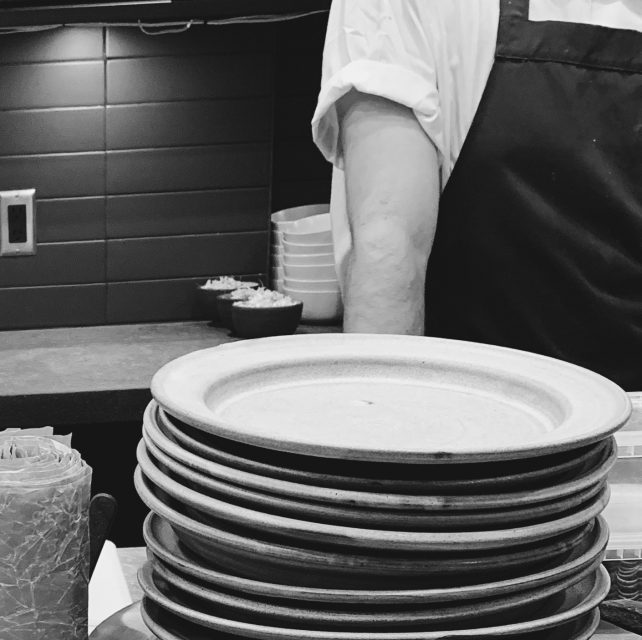 In conclusion, the whole process from the preparation to the close is a secular food ritual. We use objects that are specified for the work (for example, kitchen tools) and movements that are precisely orchestrated to deliver a plate of food which requires hours- if not days, of hard labour and attention to the details. The process requires concentration, energy and focus to stay alert, but also a sensibility to transfer our passion to the guests. We welcome them in a certain way, warmly but professionally, as if they are entering a sacred place organized according to methodical rules and order. Everyone has a special position, not hierarchical- but organized by technique.
In conclusion, the whole process from the preparation to the close is a secular food ritual. We use objects that are specified for the work (for example, kitchen tools) and movements that are precisely orchestrated to deliver a plate of food which requires hours- if not days, of hard labour and attention to the details. The process requires concentration, energy and focus to stay alert, but also a sensibility to transfer our passion to the guests. We welcome them in a certain way, warmly but professionally, as if they are entering a sacred place organized according to methodical rules and order. Everyone has a special position, not hierarchical- but organized by technique.
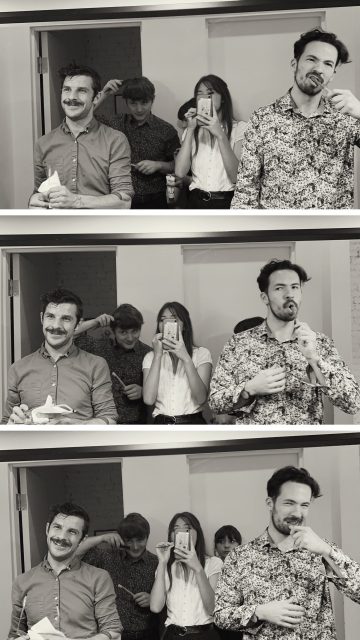 The ritual communicates core values like innovation, perseverance, commitment and passion. We all have to possess a certain creativity to constantly change and evolve, as much in the kitchen as for the Service Staff. We also value perseverance because it requires courage and motivation for us to to make the chaos look calculated. We have strict rules in terms of how to approach a client. We must stay professional, yet have a certain relationship with the table to form trust. Commitment is a quality of being dedicated to -not only your job- but your loyalty to the functioning of the kitchen. And the most important value of all, passion. If what connects us is gastronomy, then the very core would be our sensibility to our five senses through food and the complex yet overarching obsessive passion of working in a restaurant. Everyone works with each other with so much synchronization it feels more like dancing than working. This work is much more than a job, but a partnership to understand human interaction through a passion that unites us.
The ritual communicates core values like innovation, perseverance, commitment and passion. We all have to possess a certain creativity to constantly change and evolve, as much in the kitchen as for the Service Staff. We also value perseverance because it requires courage and motivation for us to to make the chaos look calculated. We have strict rules in terms of how to approach a client. We must stay professional, yet have a certain relationship with the table to form trust. Commitment is a quality of being dedicated to -not only your job- but your loyalty to the functioning of the kitchen. And the most important value of all, passion. If what connects us is gastronomy, then the very core would be our sensibility to our five senses through food and the complex yet overarching obsessive passion of working in a restaurant. Everyone works with each other with so much synchronization it feels more like dancing than working. This work is much more than a job, but a partnership to understand human interaction through a passion that unites us.
Most of us are introverted, shy or simply beings that doesn’t easily open up. But this cathartic ritual teaches us to live, to love, to speak – because it’s our only way of communicating with the rest of the world. It is a language, like any other. It is an art through which we expressing our need to exist through our own sensitive canvas. This ritual builds relationships that are bounded and profound and are much more than just friendships.

